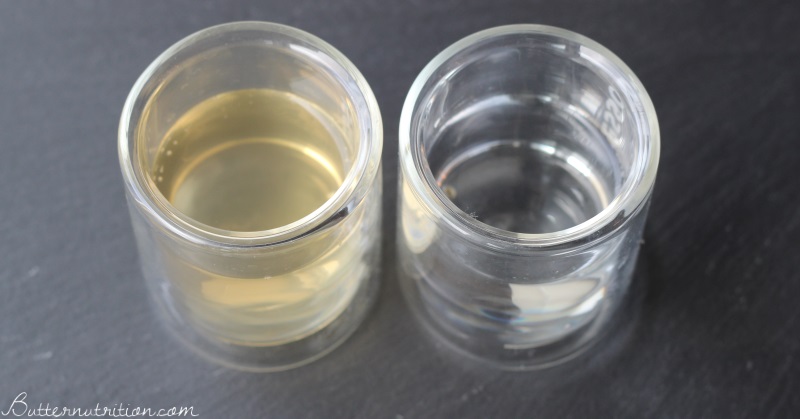Do you consider yourself to have good digestion? Without it, it's impossible to make any real progress with your nutrition and overall health. Unfortunately, digestion is frequently ignored and overlooked; acting as a barrier that keeps you from reaching your health goals.
What can poor digestion look like?
Here's just a FEW clues your digestion is weak:
- Belching or gas within one hour after eating
- Heartburn or acid reflux
- Feeling bloated within one hour after eating
- Prolonged vegan diet
- Bad breath
- Loss of taste for meat
- Sweat has a strong odor
- Stomach upset by taking vitamins
- Feel like skipping breakfast/feel better when you don't eat
- Sleepy after meals
- Fingernails chip, peel, break, or don't grow
- Anemia unresponsive to iron
- Stomach pains or cramps
- Diarrhea chronic or shortly after meals
- Undigested food in stool
- Crave acidic foods (vinegar, citrus)
What causes poor digestion?
Inadequate stomach acid is one of the many ways that malnutrition can start and it's estimated that 90% of Americans have low stomach acid. This can be caused by a gut infection called H-Pylori, slowed metabolism, food allergies, stress, poor diet, nutrient deficiencies, a low protein diet, too much alcohol, and countless other factors. This reduced acidity in the stomach weakens the first line of defense against pathogens and sets off your digestive cascade with an incorrect pH, which leads to incomplete digestion. Eventually this can cause intestinal problems, acid reflux, and predispose you to food allergies and autoimmune disease-many of which I'm sure you are aware of.
Strong stomach acid= good digestion
Strong stomach acid is a precursor for good nutrition and it is required for the absorption of important vitamins and minerals such as calcium, zinc, iron, and B vitamins that require a highly acidic environment for absorption. It's also required to activate pepsin in the stomach to cleave apart amino acids (building blocks of protein) so they can be fully and properly absorbed.
If your digestion is inadequate, then the integrity of each cell, tissue and organ in your body will suffer, thus opening you up to a host of health problems. If you can't actually break down and absorb your food, it can't be USED to nourish your body; which creates a pretty HUGE problem.
Digestive Supplements
The idea of solving the body's problems with a pill is wonderful in theory (I mean who doesn't want to feel better overnight?), but in reality, we all know it's nothing more than quick fix and cover-up for what is REALLY going on. You see this most in Western Medicine with the use of pharmaceuticals, but unfortunately it happens often in the natural health arena as well. This is not always a bad thing, but it can be...
One of the most popular digestive supplements is hydrochloric acid (HCL). HCL in simple terms works to add acidity to your stomach that helps trigger the pH driven digestive cascade properly. Many find HCL helpful because low stomach acid is very common, especially for those with a history of dieting (low calorie, low carb, vegetarian & vegan diets), or consume a low nutrient diet. But does that really make it a good idea?
I'm personally not a fan of this kind of digestion supplement. When you take Betaine HCL with a meal to increase your own stomach acid, in many ways it just "masks" the deeper problems, which lead you to continue with destructive dietary habits.
Instead of asking yourself "Why am I low in stomach acid to begin with?" you find a way to adapt your digestion with a supplement. I've been witness to those taking Betaine HCL for a long period of time where it really ends up working against them. It allows them to properly digest their food, however, it also allows them to continue their destructive bad dietary habits instead of focusing on long-term improvements.
There's also the risk of using Betaine HCL improperly and causing more digestive harm than good. This can happen when you use it without the guidance of a practitioner.
My favorite ways to increase your digestion instantly
These are my two favorite ways you can increase your digestion at your next meal! Use them as often as needed. Depending on your degree of digestive dysfunction, you might only need to pay attention to these things when you eat a harder to digest meal, like those containing muscle meat. If you have strong digestion already, you may benefit from using them when you are under stress, since stress can decrease your digestive juices up to 50%!
- Drink LESS fluids with meals if possible. If you are already low in stomach acid and you're drinking 12oz plus of fluids with a meal, you are substantially diluting the little stomach acid you have! Since it's estimated that stomach acid production peaks 90 minutes after a meal, it's a good idea to get the fluids your body desires between meals instead of around meal time. While this ONE tip may seem insignificant, it can have a HUGE impact on your digestion. I've seen it countless times with clients!
- Add some natural acidity with apple cider vinegar (like this). This is a very simple and inexpensive way to support your stomach's acidity. Just add about 2 teaspoons of apple cider vinegar to about ¼ a cup of water or fresh juice to dilute it (to make it tolerable) and consume with a meal. You can use either raw apple cider vinegar (unpasteurized) OR regular. If you have very sensitive digestion and don't tolerate fermented foods very well, I would recommend avoiding the unpasteurized stuff initially. Play around with this and find out what works best for YOU!
Bottom line: Your body should be able to digest food without pills, and might need to be re-taught how to do so with these simple tips and some strategic whole food therapy. While occasionally I'm sure there is good reason to use small amounts of betaine HCL for a short period of time, I think it's best to address the REAL issues behind poor digestion, which is most frequently caused by gut pathogens and/or overgrowth conditions, slowed metabolism due to stress, dieting, not eating enough, or a low nutrient diet.
Be sure to read the next post in the digestive series - Is Your Chronic Gut Issue Really a Liver/Gallbladder Issue?
Is Nutritional Debt Causing Your Poor Digestion?
Take the quiz below to find out!
Do you have poor digestion caused by low stomach acid? What helps you the most?
PIN IT:
References:
Weatherby, Dicken. "Liver and Gallbladder." Signs and Symptoms Analysis from a Functional Perspective. Nutritional Therapy Association, 2004. Print.
Photo Credit: Depositphotos.com/kornilov17







Laura says
Hi Catherine! I have a great deal of health problems, including acid reflux. And I've heard of the helpfulness of ACV . But I'm confused because a) I don't understand if acid reflux means too little acid or too much; and b) so much of the information on the internet claims that although ACV is acidic, it produces an alkaline affect in the body, and actually neutralises stomach acid... which sounds like a bad thing! Can you help?
Catherine says
Hi Laura,
Generally acid reflux is actually caused by too little stomach acid, not too much (counter-intuitive I know)! When there is not ENOUGH stomach acid, the lower esophagus sphincter (LES) does not close properly causing acid to back-flow into the throat. If you want to read more about this you may enjoy the book "Why stomach acid is good for you." You can find a link to it here: https://butternutrition.com/resources/
Low stomach acidity is truly the cause of most health issues. Without it, you can't actually absorb nutrients (if you're eating nutrient dense food).
Abundantly,
Catherine
mel says
Go Catherine! Perfect reply, I wholeheartedly 200% agree.
Mark says
ACV has that acidic effect when it enters the stomach, just enough to cause the LES to close and tighten. That’s the way I have understood it. Makes total sense to me because when I had problems with heartburn, I drank a mixture of avc, honey ( in equal parts) like a tablespoon, in about 6 ounces of warm water, Dranknit right after and some during a meal. Stopped the heartburn before it starts.
Victor says
But you also did not mention an answer to her second question.
b) so much of the information on the internet claims that although ACV is acidic, it produces an alkaline affect in the body, and actually neutralises stomach acid… which sounds like a bad thing! Can you help?
Jo says
Agree!!!
Yasir says
The alkaline effect of ACV is not in the stomach. In the stomach, ACV has an acidic effect.
When the digestion completes, ACV produces alkaline ash, which in turn has an alkaline effect on the blood and cellular level.
With almost everything else producing acidic ash, the alkalizing effect of ACV on the blood and cellular level is very healthy.
Lily says
Hi Catherine.
Thank you so much for addressing the cause and advising on a natural treatment. I recently started taking ACV before meals and it improved my digestion and also I'm trying to add more probiotics and fermented food to my diet.
Dante says
So i choke all the time on acid im 64 years old and i am scared im on lansoprazle what else can i take the beds raised i don't eat four hours before i go to bed nothing works it comes up even when my stomachs empty
bettispaketti says
Dante r u ok
Milan says
Hi Laura! The medical doctor has got the whole concept of acid reflux incorrect as reflux is caused by too low stomach acid and it is the body's coping mechanism as the stomach reflux's acid to compensate the low stomach acid for better digestion which we experience as heartburn. So, you must increase your digestive juice by using raw apple cider vinegar with the mother, supplements like betaine HCl, and probiotics for your gut which are immensely important. Also , improving your diet with traditional wholefoods like bone broth, soups, fermented veggies and drinks. thanks.
Liz says
I added ACV for a few weeks but now if I have it my chest burns afterwards.
Rosie Kourian says
Hi dear Catherine,
I love ALL the work that you do and wanted to congratulate you on yet another wonderful post! I have one question though. I was wondering what is your take on the following: Every morning I drink lots of fluid (water + lemon juice, followed by 2-3 cups of herbal tea) - I do this as it seems to help move things through ( I am chronically constipated). Immediately after that I would normally have breakfast (egg yolks (I don't do well with the egg whites), potato salad and cucumber - I love savoury food to begin my day with). I've always known this much liquid and a breakfast immediately after that is a bad idea BUT this is the only way I get to go to the toiler (sorry for the honesty here)! And I am very prone to bloating!!! Would be very grateful to hear what you think!
Thank you and again, love you work!
mel says
If u want an amazing food source to help u 'go' then research adaptogens.
Lily says
Rosie, you may need to read about macrobiota. The symptoms you described may be lack of good bacteria in the guts; look for information on homemade kefir, yogurt, sauerkraut, yakult and other fermented foods that have good bacterias and helps replenish the gut flora and digestion. God bless.
Xx says
Rosie, there are some yoga poses which are very helpful for relieving constipation. Check them on google or YouTube. I agree with Lily's comments. And would like to add that may be you have too much bad bacteria. It could help to get tested for infections. Check Ewing your doctor and get some stool tests done. Good luck.
Lucy says
When you said fluid, does it include soup? Thanks!
Amy says
This is interesting. As a mother with a child who is having digestive issues, I'm looking into all the natural means I can find to support her digestion. For myself, I do not usually have issues in this area. However, when I am pregnant (as at the moment) I have a great deal of difficulty digesting my food. I use betain hcl and a good enzyme supplement to help. Obviously this isn't dealing with the root cause, but I haven't a clue how to do that when the cause seems to be my hormones. Thoughts?
Lori says
Hormones definitely play a role, but so does food. I struggled with IBS for years and marked episodes on a calendar. There was a direct correlation between symptoms and ovulation and menses, so even though more than one physician told me that hormones have nothing to do with digestion, my experience showed clear evidence over an extended period of time. When I started learning more about foods, the crap that's added to foods, and changed my diet, my symptoms almost disappeared entirely. I no longer eat grains, anything in a box or a package whenever possible, and rarely combine more than two food groups during a meal (hard to avoid when you're not at home!)
Good luck mama!
Lori says
Blogs so often frustrate me. Unfortunately, with all due respect, this article is frustrating.
Although stomach acid is necessary to break down food, not every individual naturally has acid. Once I read "Eat Right for Your Type" I understood so much more about our bodies and why we can't digest certain foods. For Type A blood, the only time stomach acid was mentioned was referring to meats, mainly red meats; type A blood individuals simply cannot digest them well because they NATURALLY, consistently do not produce much stomach acid. They need to eat a lot of the foods that don't require large amounts of stomach acid to break them down. No need for supplementation of any kind when you're eating the right foods, AND when we're not combining more than two food groups during one meal within any two-hour period of time. We only have the ability to break down two food groups during our meal, so much of the belching/gas is because the third and/or fourth food group is literally not being digested - it is rotting, because there are no enzymes available to break it down.
There just is NO one end-all, be-all answer to digestive problems. For every individual, there is an individual answer, but my family and friends have all seen significant changes when they primarily eat foods that bode well for their blood type and combine only two food groups at one meal.
Richard says
People have varying levels of HCL production and that puts them into the different categories. Eating foods they tolerate is just a band aid. It is all about chemistry. Some nutrients, like iron or zinc for example, oxidize in nature. At that point, they are NOT water soluble. The intestinal wall can't absorb anything unless it is water soluble. If you apply acid to the zinc oxide or iron oxide, then it dissolves the oxide and exposes the iron and zinc, which are water soluble. There is a whole list of trace minerals like this that HAVE to be exposed to acid to digest properly. I believe it all starts with stomach acid levels. They drop at 40 years old, and by 60, one third of Americans have almost no stomach acid production.
This leads to mineral deficiencies, and partially digested proteins. If you couple that with leaky gut syndrome from GMOs in the diet, massive levels of food allergies and inflammation occur.
Henry says
So if it's about the minerals would you
Suggest himiliyan salt with food?
What about Swedish bitters as well?
I don't tolerate fermented foods very well.
Jodie says
Thanks for these tips. I have a few questions:
What are your thoughts on collagen tablets? Which is the best one to buy?
2. What are your thoughts on Barbara's puffins cereals? I like the oat squares though I have not bought it in over a year. I never go over the serving size. If it's says 1/2 cup that's what I eat. Love cereal but keep hearing how bad it is for you.:( thanks
Ulrike says
Hi! I also battle with low stomach acid and was told to use apple cider vinegar but find that I bloat instantaneously afterwards. You mentioned to stay away from unpasteurized ACV ay first. I am taking the Braggs ACV in the moment. Could it be that it's causing me to bloat because its unpasteurized? Why is the pasteurized easier to tolerate? Funny that you mentioned fermented foods in general, because everywhere I research it says that fermented veggies like sauerkraut are the best for digestive disorders and contain many probiotics, but once again I bloat like crazy even if I just eat a little of it....I'm really battling! Any suggestions? Thank you
Jeanine says
Hi catherine, thanks for the info. Bery useful. Quick question. The apple cider vinager: when during the day do i need to take this?
mel says
With your meals. I think we can listen to our body if we need Apple cider vinegar with every meal or just once or twice a day.
Krishna says
so what foods can i eat to increase stomach acid? i am a vegetarian and i have avoiding dairy like low fat yogurt and milk. It is not helping. i have a lump in my throat that won't go away. please help!!
any foods i can add . i never tried apple cider vinegar. but anything else in diet wise?
kirtana says
Hi! I would be super glad if you could respond to this. I have always had normal skin, with only occasional pimples. And till recently even when I got a pimple it would be gone in 2 days. But recently a whole bunch of tiny bumps have come up on my cheekbone area and my forehead. Some are pimples but most are just bumps. Is it my stomach showing me how unhappy it is? I genuinely don't know how I should go about curing this. Help me please?
Thank you ! :))))))
Amy says
Hi Kirwan a I am not an expert but this may be a good sign. One of your bodies ways to expel toxins is through the skin. So it could be that you are detoxing. If that is so do not put anything on it let it do its thing. I see your post was in October so it is probably resolved by now. Hope this helps some.
Amy says
Sorry my auto correct changed your name Kirtana.
Cheri says
Hello,
If one cannot use acv is there an alternative?
Thanks
Cheri
Elizabeth says
This is late but my doctor says warm lemon water is a fine substitute.
Bebe says
Hi
I find that eating more sea salt makes my stomach more acidic
And the digestive system works a lot better because our stomach is very acidic to break down the food we process
Also sea salt when u are mensturating 1/4 teaspoon of sea salt during this time stops cravings and because we loose so much fluid and electrolytes they need to be replaced
Ta Beb
Brad says
I was put on klonopin about 4 years ago and I developed food allergies after I eat it takes about 1 hr it's hard to braeth for about 2-3 hours then I don't have bowl movement I'm taking HCl and digestive enzymes if I try to stop or taper back I get anxiety and feel cruddy after eating I think the klonopin wrecked my stomach I'm gluten free no dairy low carbs no sugar would love some insight thank you.
Carol says
One word: MASTICATION! (I.e. CHEWING our food well! ) My friend's daughter's digestive woes went away with this simple step. It's a no-brainer that this allows the nutrients in our food become more easily absorbed. You've given your system a head start. It also gives the food more time to come in contact with the many enzymes in your saliva. Good health everyone!
Karen Carter says
I would like to know how long should you wait to eat after you've had something to drink?
Also, how long should you wait to drink after you've eaten?
Thank you.
Kerry says
Hi Karen,
That's a good question. I would like to know the answer too. "How long" before and after a meal, so that it doesn't interfere with digestion?
Kim says
Drink at least 20 minutes to an hour before eating. It helps activate digestive juices. I wait an hour to drink afterwards.
Ahmad Zuha says
You forgot to CHEW! 😜
Mohsen says
1. Drink some water before meal. No water while u eat or after meal.
2. Chew well.
3. Use fresh lemons or vinegar, for good digestion, with ur meal.
Life is easy, if we humans dont make it hard... animals live way healthier lives than humas...and they dont read a word.
Lissa says
Catherine, why did you not answer people's questions. Rather frustrating.
Nandarani~Nancy says
People have pressures and none of us is perfect; we are really all so vulnerable. I see this clearly the older I get. I hope she does come back and answer the questions; this is something seen elsewhere on line. It's a big responsibility taking on your own website; not everyone is up to it continuously - she may be back.
Elizabeth Gillam says
I agree, Lissa
Sarah G says
I've been trying to figure out for over a year now if I have low or high stomach acid, I have GERD and formerly Chronic Gastritis with some erosions which my gastroenterologist seemed to think was gone. I also am trying to overcome esophagitis. So, I can't play around with acidic stuff much. My question is this...what are the symptoms for HIGH stomach acid. I can never find any info on that. And would low or high stomach acid make taking deeper breaths harder after eating ?
Thanks!
Kemal Delalic says
From my own experience, you'll suffer from weak stomach acid because of
1) Not chewing your food properly. Chewing will start off the whole digestion process including enzyme release. The largest mistake people make is not chewing the meat so they figure they don't tolerate meat well and go vegan. Nobody wants to chew on every bite of that beef steak 50 times but it's how it works - if you feel the food when swallowing, you didn't chew it enough
2) Drinking too much liquids during meal to compensate for not chewing your food enough. What this does is - first, you won't get enough stomach acid release because you're not chewing enough PLUS you are diluting the little stomach acid you have using water / other liquids. This is basically what is killing your digestion.
3) Drinking protein shakes without something to chew on. This one is pretty obvious - protein needs pepsin to be digested, you're not chewing thus not getting the pepsin to digest the protein into amino acids. At least put a chewing gum in before / after drinking a protein shake, it'll help you.
Kelley says
Stupid easy?